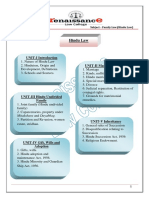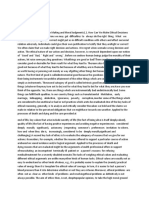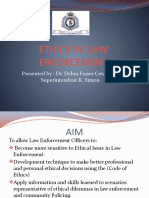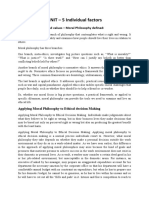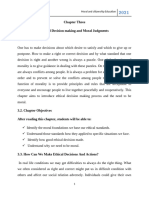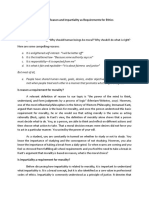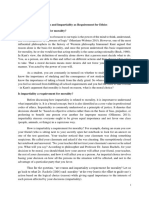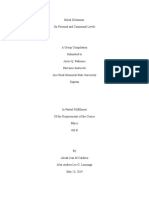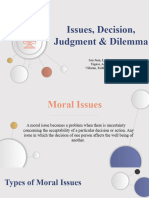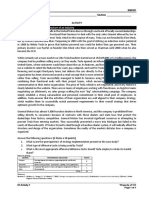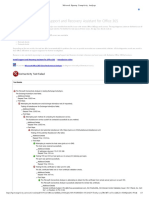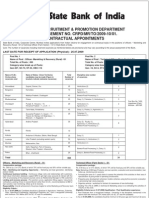Ethics Written Task 2 Mid Term Period
Ethics Written Task 2 Mid Term Period
Uploaded by
Aaron LipanaCopyright:
Available Formats
Ethics Written Task 2 Mid Term Period
Ethics Written Task 2 Mid Term Period
Uploaded by
Aaron LipanaOriginal Title
Copyright
Available Formats
Share this document
Did you find this document useful?
Is this content inappropriate?
Copyright:
Available Formats
Ethics Written Task 2 Mid Term Period
Ethics Written Task 2 Mid Term Period
Uploaded by
Aaron LipanaCopyright:
Available Formats
Name: Lipana, Robert Aaron O. Section: Crim 14 Date: Nov.
30, 2023
WRITTEN TASK 2 IN ETHICS (MID-TERM PERIOD)
1. Explain in your own words this proposition “Moral Standard overrides other standards. 10
points). Use the space below in answering this question. Limit yet make your answer sensible.
The premise "Moral Standard overrides other standards" implies that ethical principles, such as
those concerning right and wrong behavior, take precedence over other sorts of standards. This
means that when presented with a choice, decision, or action, moral ideals should take
precedence above other reasons such as legal, conventional, or personal preferences. The
premise is that the welfare of beings, governed by moral norms and ideals, should take
precedence over standards based on authority, tradition, or individual interests. This ranking
shows a conviction in the basic importance of ethical behavior in affecting our behaviors and
judgments.
2. Cite and discuss 2 reasons why moral dilemma is important to man. 10 points. Use the space
below in answering this question. Limit yet make your answer sensible.
1. Guidance for Ethical Decision-Making: Moral dilemmas are important because they force
people to confront opposing moral ideals. When confronted with such quandaries, people are
forced to reconsider their principles and beliefs. This introspection helps them make ethical
decisions that are consistent with their underlying values. Moral quandaries, in this way, serve
as a practical tool for individuals to sharpen their ethical compass and navigate challenging
situations with integrity.
2. Personal Growth and Character Development: Confronting moral quandaries promotes
human development and character development. These difficult situations need individuals
grappling with ethical complexities, making difficult judgments, and facing the repercussions of
their actions. Overcoming moral quandaries fosters resilience, empathy, and a more in-depth
grasp of one's principles. It helps to shape individuals into morally responsible members of
society by fostering the development of a more complex and principled character.
3. Read and cite your utmost views, (ethical justification) on these 2 situations. Cite the
level of moral development and moral dilemma that may influence your course of
action.
A. You are at your best friend's wedding just an hour before the ceremony is to start. Earlier that
day, you came across definitive proof that your best friend's spouse-to-be is having an affair with
the best man/maid of honor, and you catch them sneaking out of a room together looking
disheveled. If you tell your friend about the affair, their day will be ruined, but you don't want them
to marry a cheater. What will you do? Use the space below in answering this question. Limit yet make
your answer sensible.
Level of Moral Dilemma: Personal Dilemma (5 points)
Level and stage of Moral Development: Post-Conventional Level; Stage 5 (5 points)
Your Ethical Justification (10 points)
In this particular dilemma, I am torn between competing obligations to a friend and the moral obligation to report
a big betrayal.
I favor social contracts and individual rights at the Post-Conventional Level, notably Stage 5. My ethical justification
arises from a desire to protect the right to honesty and transparency in interpersonal relationships. Regardless of
the potential immediate implications of ruining the wedding day, I believe that long-term principles such as fidelity
and authenticity are of the utmost significance.
My selected ethical course of action include addressing the evidence with my friend in private, realizing the
potential consequences, and emphasizing the need of joining a marriage based on trust and honesty. This decision
corresponds to a higher moral development stage in which universal ethical ideals take precedence over
immediate human relationships. My emphasis is on the people' long-term well-being and integrity, demonstrating
a dedication to a higher sense of morality.
B. You are an eyewitness to a crime: A man has robbed a bank, but instead of keeping the money
for himself, he donates it to a poor orphanage that can now afford to feed, clothe, and care for its
children. You know who committed the crime. If you go to the authorities with the information,
there's a good chance the money will be returned to the bank, leaving a lot of kids in need. What
will you do? Use the space below in answering this question. Limit yet make your answer sensible.
Level of Moral Dilemma: Personal Dilemma (5 points)
Level and stage of Moral Development: Post-Conventional Level; Stage 5 (5 points)
Your Ethical Justification (10 points)
The moral struggle in this personal dilemma arises from the friction between loyalty and the ethical
need to disclose a substantial violation of the law.
The ethical justification for the Post-Conventional Level, particularly Stage 5, centers around upholding
individual rights and social contracts. While recognizing the altruistic motivation behind the crime is
important, the adherence to universal ethical values, especially the significance of law enforcement,
takes precedence.
The selected ethical course of action entails reporting the crime to authorities while also acknowledging
the probable implications of returning the money to the bank. This decision corresponds to a higher
moral development stage in which the relevance of social contracts and individual rights is recognized,
even in the face of humanitarian intentions. The goal is to negotiate the personal quandary in a way that
attempts a balance between justice and the well-being of the children in need, while also taking into
account the broader ramifications of the actions made.
“People will forget what you said, people will forget what you did, but
people
will never forget how you made them feel”
You might also like
- Case Title: Soft Drink and Beer Point of ViewDocument11 pagesCase Title: Soft Drink and Beer Point of ViewJen Ner100% (4)
- Heena Three Part Structure Outline TemplateDocument6 pagesHeena Three Part Structure Outline TemplateHeena AdtaniNo ratings yet
- Panch Kalyanak Mahotsav - A Brief Introduction: Five Auspicious Events Are: Day One: Garbha-Klyanak-Inception CeremonyDocument2 pagesPanch Kalyanak Mahotsav - A Brief Introduction: Five Auspicious Events Are: Day One: Garbha-Klyanak-Inception CeremonyPamNo ratings yet
- EthicsDocument36 pagesEthicsAntonio BaptistaNo ratings yet
- Moral VS Non Moral StandardsDocument20 pagesMoral VS Non Moral StandardsGermin CesaNo ratings yet
- EthicsDocument3 pagesEthicsSophia Ella Onan100% (5)
- Doing the Right Thing Bible Study Participant's Guide: Making Moral Choices in a World Full of OptionsFrom EverandDoing the Right Thing Bible Study Participant's Guide: Making Moral Choices in a World Full of OptionsNo ratings yet
- Ra 386 Civil Code of The Philippines AnnotatedDocument16 pagesRa 386 Civil Code of The Philippines AnnotatedMarie Mariñas-delos Reyes100% (1)
- LLB Family Law Hindu Law 1Document79 pagesLLB Family Law Hindu Law 1PMR2020Batch 3 Yr LLB Batch75% (4)
- Chapter Three CivicsDocument8 pagesChapter Three CivicsHenok FikaduNo ratings yet
- Week 2 DilemmasDocument3 pagesWeek 2 Dilemmasaila mae abulenciaNo ratings yet
- Moral Decision MakingDocument5 pagesMoral Decision MakingMary Maddie JenningsNo ratings yet
- Ethics Midterm CoverageDocument38 pagesEthics Midterm CoverageLEAH HURTADANo ratings yet
- ETHICSDocument9 pagesETHICSPhoebe TuyogonNo ratings yet
- The Idea of Role Morality Applicable To The Situation of ProfessionalsDocument31 pagesThe Idea of Role Morality Applicable To The Situation of ProfessionalsKushal MaldeNo ratings yet
- Lesson 1 - Ethics and Its TenetsDocument9 pagesLesson 1 - Ethics and Its TenetsMark Louie RamirezNo ratings yet
- Lecture 1 Role of Family and Society Lyst6297 240129 081145Document15 pagesLecture 1 Role of Family and Society Lyst6297 240129 081145Pragnya ChowdharyNo ratings yet
- %%%%%%CIVICSDocument9 pages%%%%%%CIVICSmutgatkekdengNo ratings yet
- What Are Moral Dilemmas?Document8 pagesWhat Are Moral Dilemmas?redgeNo ratings yet
- Ethics in Law EnforcementDocument30 pagesEthics in Law Enforcementgregoryisaacs911No ratings yet
- Moral DilemmasDocument33 pagesMoral DilemmasJb Patnugot50% (2)
- REVIEWER ETH (Midterm)Document5 pagesREVIEWER ETH (Midterm)cynthia karylle natividadNo ratings yet
- Lesson 3 Moral and Non Moral Standard - Moral Dilemma - Three Levels of Moral DilemmaDocument3 pagesLesson 3 Moral and Non Moral Standard - Moral Dilemma - Three Levels of Moral DilemmaEms TeopeNo ratings yet
- ReviewerDocument3 pagesReviewerAkheza LadezaNo ratings yet
- Things Are Intrinsically and Instrumentally Good or Bad? and Give Examples of Things Intrinsically and Instrumentally Good or Bad in Your SocietyDocument8 pagesThings Are Intrinsically and Instrumentally Good or Bad? and Give Examples of Things Intrinsically and Instrumentally Good or Bad in Your SocietyAbenezer SisayNo ratings yet
- Lesson For Week 9 - 11 Ix. The Moral AgentDocument15 pagesLesson For Week 9 - 11 Ix. The Moral Agentroselyn ayensaNo ratings yet
- Business Ethics ClassDocument46 pagesBusiness Ethics ClassClaudia Aguirre FernandezNo ratings yet
- Ethics: Moral Standards vs. Non-Moral StandardsDocument17 pagesEthics: Moral Standards vs. Non-Moral StandardsLilian LagrimasNo ratings yet
- Introduction To Moral TheoriesDocument25 pagesIntroduction To Moral TheoriesDark SwordsmanNo ratings yet
- MGMT Final ExamDocument12 pagesMGMT Final ExamAmmar KamilNo ratings yet
- Moral DilemmasDocument34 pagesMoral DilemmasManongdo Allan100% (1)
- Ethics MidtermsDocument16 pagesEthics MidtermsLOUISSE ANNE MONIQUE L. CAYLONo ratings yet
- UNIT - 5 Individual Factors: Moral Philosophies and Values - Moral Philosophy DefinedDocument6 pagesUNIT - 5 Individual Factors: Moral Philosophies and Values - Moral Philosophy DefinedAbhishek ThakkarNo ratings yet
- Moral DilemmaDocument6 pagesMoral DilemmaJosue SorianoNo ratings yet
- Moral Decision MakingDocument5 pagesMoral Decision Makingapi-26570979100% (2)
- Lesson 3 Moral DilemmaDocument30 pagesLesson 3 Moral DilemmaAnnie JoeNo ratings yet
- Ethics Module 2...Document9 pagesEthics Module 2...elle68078No ratings yet
- Moral Standards Involve The Rules People Have About The Kinds of Actions They Believe Are MorallyDocument11 pagesMoral Standards Involve The Rules People Have About The Kinds of Actions They Believe Are MorallyKezzel Dannah Napawit100% (1)
- Lesson 3Document7 pagesLesson 3Frences Rhea CabatcheteNo ratings yet
- Bba AssignmentDocument15 pagesBba AssignmentMaryam ShakoorNo ratings yet
- Chapter 3 moral educationDocument15 pagesChapter 3 moral educationbirukgeremew3No ratings yet
- Bus 401 Amu by SiddiqueDocument12 pagesBus 401 Amu by SiddiqueAbuBakarSiddiqueNo ratings yet
- Final Ethics Lessons 10 11Document7 pagesFinal Ethics Lessons 10 11Jenipe Rondina CodiumNo ratings yet
- EdmDocument12 pagesEdmHarish Singh PanwarNo ratings yet
- Oral Eliberation: Michael J. SandelDocument7 pagesOral Eliberation: Michael J. SandelAlliah Navarro Marquez IINo ratings yet
- Ethics 1Document5 pagesEthics 1Jason Roel LlenaNo ratings yet
- Ethics Week 3-4Document13 pagesEthics Week 3-4Sir BenchNo ratings yet
- EthicsDocument64 pagesEthicsCindy DivinaNo ratings yet
- Reason and Impartiality As Requirement For Ethics Is Reason A Requirement For Morality?Document5 pagesReason and Impartiality As Requirement For Ethics Is Reason A Requirement For Morality?Sol GomezNo ratings yet
- Ss121 Lesson 1Document16 pagesSs121 Lesson 1Kimberly C. LantoriaNo ratings yet
- Business Ethics SummaryDocument23 pagesBusiness Ethics SummarySatish ChavanNo ratings yet
- Pe 4Document10 pagesPe 4Kuntal VasoyaNo ratings yet
- Chapter 1Document16 pagesChapter 1Jaime NashNo ratings yet
- EigthicsDocument10 pagesEigthicsalisah jean calabriaNo ratings yet
- EthicsDocument6 pagesEthicsKaito FinNo ratings yet
- Lesson 2: Morality and Moral StandardsDocument2 pagesLesson 2: Morality and Moral StandardsShoaib AlamNo ratings yet
- Hsomer Model of Ethical AnalysisDocument17 pagesHsomer Model of Ethical AnalysisJemila SatchiNo ratings yet
- Stages of Moral DevelopmentDocument8 pagesStages of Moral DevelopmentWarisha LodhiNo ratings yet
- ETHICS - Lesson 2Document40 pagesETHICS - Lesson 2Shadrach MalanaNo ratings yet
- What Are Moral DilemmasDocument8 pagesWhat Are Moral DilemmasRomyna Mae Galang100% (1)
- Presentation On: Moral Development & Normative and Discreptive Concpet of MDDocument21 pagesPresentation On: Moral Development & Normative and Discreptive Concpet of MDMOHD.ARISHNo ratings yet
- Issues Decision Judgment and DilemmaDocument17 pagesIssues Decision Judgment and DilemmaPrincess DueñasNo ratings yet
- Ethics NotesDocument15 pagesEthics NotesBHAVYAN AGARWALNo ratings yet
- Decoding Right from Wrong: 7 Key Strategies for Ethical Decision-MakingFrom EverandDecoding Right from Wrong: 7 Key Strategies for Ethical Decision-MakingNo ratings yet
- CofferdamsDocument31 pagesCofferdamsDeepankumar Athiyannan67% (3)
- ksp-151 Syrian Refugees Persuasive EssayDocument9 pagesksp-151 Syrian Refugees Persuasive Essayapi-350098277100% (1)
- Disaster Nursing SAS Session 21Document10 pagesDisaster Nursing SAS Session 21Niceniadas CaraballeNo ratings yet
- 25th Marine Drive Amateur Individual Net Summary: Rank Score PlayerDocument4 pages25th Marine Drive Amateur Individual Net Summary: Rank Score PlayertoddkuspiraNo ratings yet
- Financial Performance Analysis ThesisDocument8 pagesFinancial Performance Analysis Thesissow1vosanyv3100% (2)
- Math CorrigerDocument1 pageMath CorrigerLeïla PNo ratings yet
- IT Essentials CH 5Document13 pagesIT Essentials CH 5fayeraoNo ratings yet
- Anti - Sexual Harassment ActDocument32 pagesAnti - Sexual Harassment ActAibo GacuLaNo ratings yet
- Tesla Drives To Change The Structure of An Industry: ActivityDocument1 pageTesla Drives To Change The Structure of An Industry: ActivityAyen MarquezNo ratings yet
- Modern History TimelineDocument2 pagesModern History TimelineDeepika JayaramanNo ratings yet
- Manhunt ErasureDocument1 pageManhunt ErasureDonaldNo ratings yet
- Chapter 3 Lesson 2 - Group 9Document23 pagesChapter 3 Lesson 2 - Group 9LalicanTeresa 1BTLEDANo ratings yet
- Changes in My LifeDocument1 pageChanges in My LifeFrancis VillanuevaNo ratings yet
- Application Pos Country Notes Component/Appserver/ Database NameDocument27 pagesApplication Pos Country Notes Component/Appserver/ Database NameNihar Ranjan MishraNo ratings yet
- Long Term PlanDocument5 pagesLong Term Planapi-463649666No ratings yet
- About Civil ServicesDocument6 pagesAbout Civil Servicesrahul koyyeNo ratings yet
- Close IMC 9e Ch08 Ejm2Document13 pagesClose IMC 9e Ch08 Ejm2Surbhi SharmaNo ratings yet
- Au Ah LapDocument11 pagesAu Ah LappaulmartogiNo ratings yet
- Microsoft Remote Connectivity AnalyzerDocument3 pagesMicrosoft Remote Connectivity Analyzermanket59@gmail.comNo ratings yet
- HQ 90277 SMDocument2 pagesHQ 90277 SMTariq BasheerNo ratings yet
- Comp Dealer PDFDocument4 pagesComp Dealer PDFmanishaNo ratings yet
- Social Intelligence Test PDFDocument3 pagesSocial Intelligence Test PDFtheresenatividad05No ratings yet
- Sheetal Shirish Gawde: Career ObjectiveDocument2 pagesSheetal Shirish Gawde: Career ObjectiveSheetal gawdeNo ratings yet
- State Bank of India - Apply 27th July'09Document2 pagesState Bank of India - Apply 27th July'09VigneshNo ratings yet
- Why The Supreme Court Is As Political As The Other Powers of The State?Document3 pagesWhy The Supreme Court Is As Political As The Other Powers of The State?Mauricio Alejandro Rosales PortilloNo ratings yet








